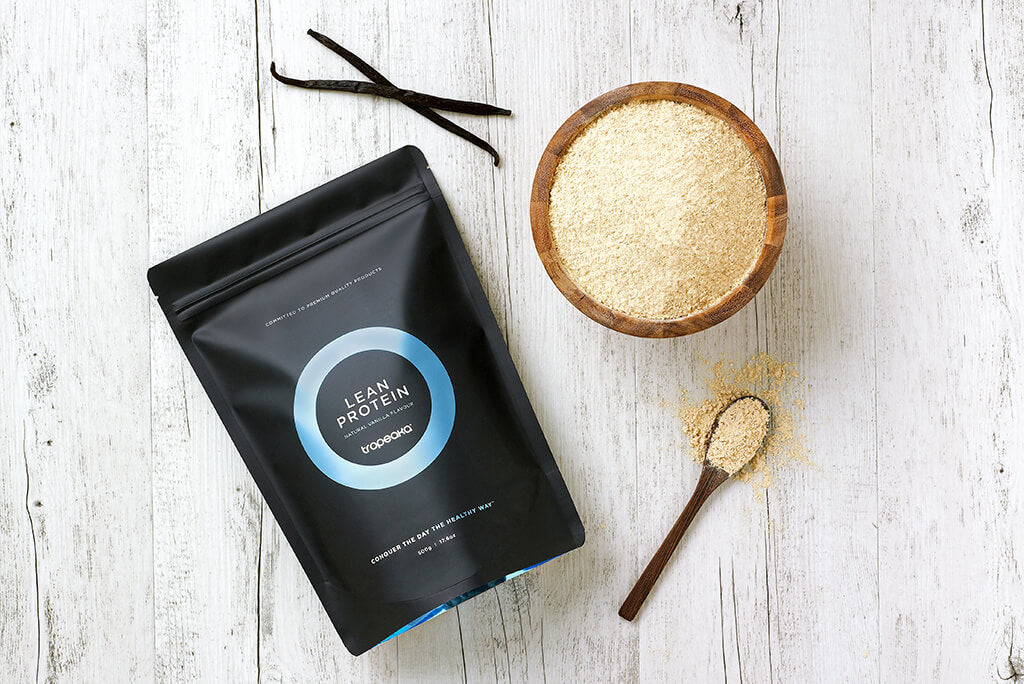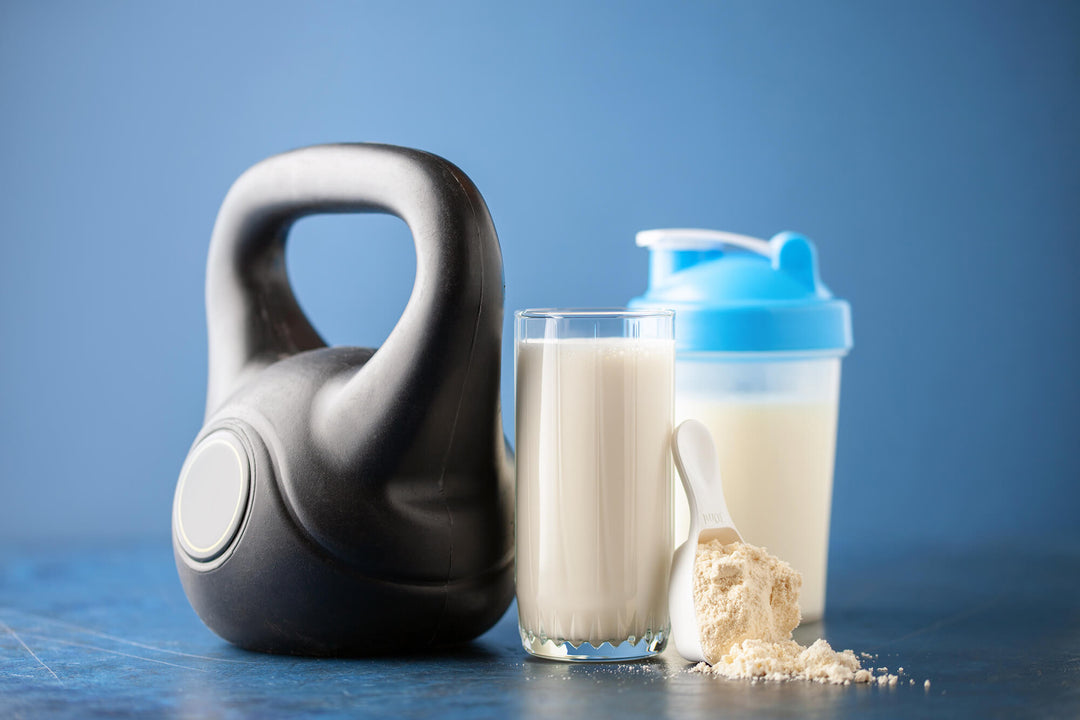Whey protein is a popular supplement that many athletes and bodybuilders use when they are trying to build muscle mass or get rid of extra body fat. It contains essential amino acids that aid in building muscle tissue and is often used as a dietary supplement or post-workout drink.
W
hile there is all sorts of hype and plenty of marketing tactics out there to make whey protein seem like a miracle supplement, it's important to know what you're really putting in your body and the possible adverse health effects it may potentially cause.
In this article, we'll share what you really need to know about whey protein and provide an alternative way to get the protein supplementation you need without any potential harmful side effects from whey.
What is Whey Protein?
In the simplest terms, whey protein is a by-product of cheese making. It's made from milk that has been separated into curds and whey. The whey is then concentrated and processed in order to make it suitable for human consumption. Whey protein is typically sold in a powder as a dietary supplement, so the water is removed from the whey and is made into a powder concentrate.

Whey protein contains all of the essential amino acids needed to build muscle tissue, as well as many other nutrients, including vitamins B12, D2, E, and K, calcium, magnesium, phosphorus, zinc, potassium, sodium, iron, copper, manganese, iodine, selenium, and pantothenic acid.
Some people choose to use whey protein as a supplement to help increase lean body mass. This is because whey protein contains high levels of branched-chain amino acids (BCAAs), the building blocks of protein. These essential amino acids have anabolic properties, which means they stimulate muscle growth and promote fat loss. The consumption of around 12-30 grams of protein per serving helps with muscle building and increases strength and endurance.
Whey is typically added to protein shakes, snack bars, and other whey protein supplements to increase your daily protein intake. The most common type of whey protein used today is isolated or concentrated casein protein. Casein is a milk protein that is more commonly known as an animal source protein. However, there are several different forms of whey protein available on the market today.
3 Main Types of Whey Protein
1. Whey Protein Concentrate
Whey protein concentrate is about 75% protein and contains some level of lactose, sugar, and fat. It has a higher calorie density and can take longer to be absorbed by the muscles. It is often used in pre-workout drinks because it provides quick energy.
2. Whey Protein Isolate
Whey protein isolate contains up to 95% protein content and has the lowest amount of other nutrients. It has less fat and lactose but still contains milk products.
3. Hydrolyzed Whey Protein
Hydrolyzed whey protein is a broken-down version of whey that can be easier on the digestive system. Hydrolyzed whey protein contains around 85% protein content and is the easiest and quickest to digest of the three.
Consumption of whey protein can also have a number of negative health effects
Health Effects of Consuming Whey Protein Powder
Protein can come from a number of sources. The best way to get protein is through our food. Animal food sources like meat, fish, eggs, dairy, and poultry are great sources of protein. Plant-based sources of protein include beans, peas, grains, oats, nuts, and fruits and vegetables. If you need to supplement with a protein powder to get sufficient protein in your diet, you can either choose animal-based protein powders (like whey) or plant-based protein powders.

When you consume protein in the right ways, it has plenty of benefits. Protein helps our bodies recover after exercise, build lean muscle, maintain healthy body weight, and boost metabolism. While there are some benefits of whey protein, it's important to note that the consumption of whey protein can also have a number of negative health effects.
Potentially Creates Inflammation
The first thing you should know about whey protein is that it can be inflammatory to some individuals. When you eat foods that are rich in inflammation, your body produces more hormones called cytokines. Cytokines are chemicals that help regulate the immune response. They are released when your body detects something harmful and helps your immune system respond appropriately.
When your body is inflamed, it creates antibodies to fight off foreign invaders such as bacteria and viruses. These antibodies are stored in your liver and spleen until they are needed. With too much inflammation, these organs will become enlarged, and this can lead to health problems.
Digestive Issues
Another reason many people choose to avoid whey protein is that it can cause digestive issues in some individuals. When you consume whey protein, it does not stay in your stomach for long. Instead, it travels through your small intestine, where it gets broken down into amino acids. Once the protein reaches the colon, it is digested further and converted into glucose. This means that if you have a sensitive gut, you may experience bloating, gas, diarrhea, constipation, and cramping.

Since it contains lactose and milk products, people who have dairy sensitivities or are lactose-intolerant are especially susceptible to digestive issues when consuming whey protein.
Heart Disease
A study published in the Journal of Nutrition showed that those who consumed high levels of whey protein had increased levels of C-reactive protein (CRP). CRP is a marker for inflammation in the blood. High levels of CRP can indicate heart disease risk. In addition, another study published in the American Journal of Clinical Nutrition showed that those who ate a diet with a high amount of whey protein had higher levels of LDL cholesterol. LDL cholesterol is also associated with heart disease.
Elevated Blood Acidity
It has been shown that excessive whey protein supplementation may increase acidity in the blood. Acidic blood can damage your teeth and bones. If you have osteoporosis or brittle bones, it could make them weak and prone to breaking.
Exposure to Heavy Metals
Some research has found that many whey protein powders contain heavy metals (lead, arsenic, cadmium, and mercury). Consuming whey protein can increase heavy metal exposure, and many of these heavy metals are toxic to humans.
Plant-based proteins do not contain any lactose, which makes them easier to digest than dairy-based proteins
Why a Plant Based Protein is Best
There are many different types of protein powders that are derived from plant sources that you can choose from. Some of these include pea protein, hemp protein, soy protein, etc. These protein sources are great for those with food allergies, certain diets, sensitive stomachs, and more. They also offer the same benefits as whey protein does.

There are many benefits to choosing a plant-based protein over whey protein. One of the main reasons is that it is better for your digestion.
Plant-based proteins do not contain any lactose, which makes them easier to digest than dairy-based proteins. Lactose is a carbohydrate found in dairy products. When you consume dairy, your body breaks down the lactose into glucose. This causes your blood sugar levels to spike causing insulin spikes. These spikes may cause cravings for sweets and carbohydrates. The best way to avoid this problem is by consuming plant-based protein instead of dairy products.
Plant-based proteins are also higher in fiber than dairy-based proteins. Fiber is an important part of our diet because it keeps us regular. It also reduces the risk of developing diseases like diabetes and obesity.
Plant-based protein powders are also:
- More environmentally friendly
- Lower in sugar content and calories
- Vegan, vegetarian, and lactose-intolerant friendly
- Full of essential vitamins, nutrients, fatty acids, and antioxidants
- Great for supporting healthy digestion for sensitive stomachs
Tropeaka protein powders are scientifically formulated to support muscle recovery with a combination of organic ingredients that contribute to the growth of muscle mass
Add Tropeaka's Protein Supplements to Your Diet
Tropeaks's protein supplements are all plant-based. We use only natural ingredients and no artificial sweeteners or flavours. Our Lean Protein supplements are vegetarian and vegan-friendly, free from dairy, soy, and gluten, and easy to digest and non-bloating.

We offer Lean, Tone, Boost, and Pump protein supplement options for whatever type of fitness supplement you may need.
Tropeaka protein powders are scientifically formulated to support muscle recovery with a combination of organic ingredients that contribute to the growth of muscle mass. All three types of protein powders are full of branched-chain amino acids (BCAAs) that give you the protein necessary for tissue building & repair.
No matter what kind of support you need in your diet, Tropeaka's plant-based proteins can offer beneficial effects for everyone.





